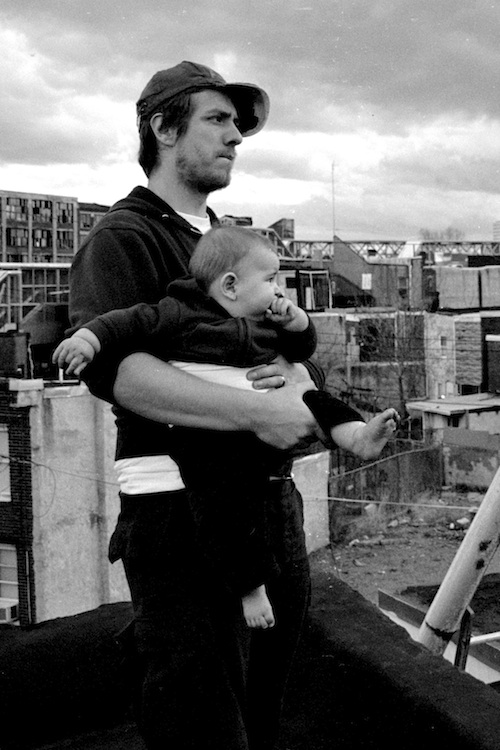Prof’s film of gun violence, family and perseverance wins top prize
Prof’s film of gun violence, family and perseverance wins top prize

Jonathan Olshefski took a detour on the way to making a great feature-length film.
He made a great short one.
Olshefski, an assistant professor in Rowan’s department of Radio, Television & Film, won the top prize in his category this summer at a prestigious conference for college and university filmmakers for After the Sound: PJ’s Story.
Just 24 minutes long, the documentary tells the story of an unstoppable 13-year-old girl who was shot in the eye by random gunfire while walking home from a North Philadelphia playground. Her shooter was never caught.
Steeped in music, After the Sound: PJ’s Story follows Patricia “PJ” Rainey, a smart, effervescent young woman growing up in a home where her father, Christopher “Quest” Rainey, mentors young musicians and runs a recording studio.
PJ is a dedicated student with a perfect attendance record who plays drums and loves to shoot baskets – dropping them cleanly through the net, one after the other. She’s a loving, healthy child in all respects but one. She has been shot and now wears a prosthetic eye.
Olshefski won the Award of Merit for After the Sound: PJ’s Story, one of 33 candidates in the Documentary Short category at this summer’s University Film & Video Association (UFVA) conference at Montana State University in Bozeman.
“The Award of Merit is the top prize, a huge honor,” he said. “The judges are some of the top professors in my field. To be acknowledged by them that I’m doing something significant and meaningful is really humbling.”
Olshefski, who primarily teaches courses in Rowan’s New Media Concentration, cut the film from footage for a feature length project, Quest: the Fury and the Sound, that he’s developing about PJ’s father.
A story that virtually begs to be told, Quest is balancing the needs of his family, the demands of his own career, and his desire to help neighborhood rappers, some of whom are wrestling with drug addiction and/or criminal records. But when one of his children is diagnosed with cancer and PJ is shot, his values are profoundly challenged.
Olshefski was one of 10 budding filmmakers out of some 200 applicants to be accepted this year into the Independent Filmmaker Project (IFP) in Brooklyn where he’s working to cut more than 100 hours of footage into an 80-90 minute film about Quest and his life.
“The Quest film is mostly shot now,” he said. “But making a feature length film is a long, arduous process where I’m wearing many hats. It’s part of your life. That film is my third kid.”
Olshefski is now in fundraising mode, seeking money from various sources to ensure that the film reaches its full potential as it moves through the completion process.
“The short has had some success but now I’m focusing on the full feature length film,” Olshefski said. “Weaving in PJ’s story with all the other threads will be even more powerful.”
Dennis Aig, professor of film and photography at Montana State University, praised the film for its storytelling and treatment of difficult issues.
“After the Sound: P.J.'s Story is an example of what might be called neo-verite,” Aig wrote. “While the film is definitely about the impacts of urban gun violence, it is more immediately about a family's ability to maintain their love for one another in the midst of a sudden and unexpected disruption of their well-planned and well-intentioned lives. It is a short film that reverberates with large resonances.”
Olshefski, whose filmmaking style immerses him in his subjects and their lives, is simultaneously making another film, Without Arrows, about a Native American man who, after living in Philadelphia for ten years while working as a professional dancer and performer, has returned to his Lakota reservation in South Dakota to be with his aging parents and reconnect with his tribe.
As with Quest and After the Sound: PJ’s Story, Olshefski is employing strong personal narratives in Without Arrows to illustrate important social issues, some of which he feels are glossed over or marginalized in mainstream news coverage.
He noted that his main subject, Delwin Fiddler Jr., is a descendant of a proud warrior culture with ties to the great chiefs Crazy Horse and Elkhead Redhair but the reservation he returns to is ravaged by poverty and a lack of resources.
“The reality is that some of the worst poverty in the U.S. is on Native American reservations,” Olshefski said. “He’s moving from a major city, where you can walk to the corner store and get whatever you want, to a place with extreme poverty, extreme issues with addiction, and it’s a very hard thing.”